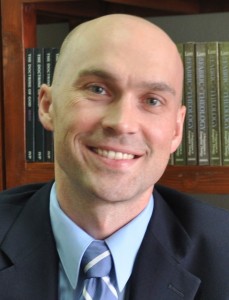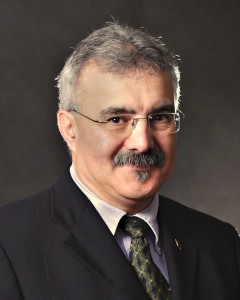By Evan D. Burns
Last Thursday many evangelicals remembered the bicentennial anniversary of the death of the great Baptist theologian, Andrew Fuller (1754-1815). Fuller’s theology and spirituality has affected me personally in numerous ways. Probably the first and most enduring influence of Fuller on my own piety has been his heavenly-mindedness.
A vision of heaven and the promised reward of being forever with the Lord captivated Andrew Fuller’s soul. From the sweetness of his heavenly meditations he penned the funeral sermon for Beeby Wallis at Kettering in April 1792. Wallis was a deacon of the Baptist church in Kettering. He served as the first treasurer of the Baptist Missionary Society (BMS). Fuller preached on “The Blessedness of the Dead Who Die in the Lord”. Though intending to eulogize and memorialize Wallis, Fuller spent the majority of his sermon expounding on biblical themes such as the need for Christian perseverance, the promise of rewards, heavenly rest, earthly labour, true blessedness, and the inevitability of death. Fuller sought to strengthen the hearts of his mourning hearers who had followed Christ even amidst affliction. He did this by elucidating the aforementioned themes, specifically the promises of heavenly rest and rewards.
Fuller’s chief text upon which he meditated for this sermon was Revelation 14:13, which says, “And I heard a voice from heaven saying unto me, Write, Blessed are the dead which die in the Lord from henceforth: Yea, saith the Spirit, that they may rest from their labours; and their works do follow them.” Fuller began by stating the original telos of this passage: “The original design of the passage seems to have been to support the afflicted followers of Christ in times of persecution.”[1] Yet, he said that though this passage was originally intended “to arm the holy martyrs against the terrors of death”[2], it does seem that it could be generally applied to Christians under other degrees of affliction as well.
First, he discussed the character of those “who die in the Lord”. They are necessarily united to Christ, as in a marriage union where two parties are united by mutual affection, common pursuits, and identical causes. So, death is the introduction of the believer’s full union with Christ. And being in this union, he described believers who die as abounding in good works just as a branch necessarily bears fruit since it is united to the vine. Second, Fuller said that part of the blessedness observed in this passage comes from the voice from heaven, which demonstrates that heaven values the saints’ homecoming whereas fallen man values worldly prosperity and security. Third, that John was commanded to write down this verse indicates the enduring blessedness of its promise for believers of all ensuing generations. Fourth, Fuller said that the phrase, “from henceforth,” refers to the time of their souls’ departure from the body in physical death. Fifth, two aspects of this post-death blessedness are rest from labours and the glorious reward of good works. And, it is in this fifth observation that Fuller expounded two predominant themes: rest from labour and rewards of grace.
Fuller designed this funeral sermon to encourage afflicted Christians to hope in future reward and to rejoice for those who have died and entered in to that eternal joy. Fuller carefully knit pastoral application with theological specificity, validating his preeminence as a pastor-theologian. He successfully demonstrated how rest from labour and reward for grace-empowered work are heavenly realities, which Christians should joyfully anticipate. In heaven, Christians will rest from all the labour they experience in this life in opposition to sin and the curse. But, their work will not cease; they will be perfected and supremely worshipful as they serve God with infinite gladness. Christians are saved not only from God’s just wrath but are also saved for eternal joy in God. Fuller longed for this heavenly rest in God, and even in his dying hours, he sought to experience the reward through prayer to God:
When under great anguish, he one day said to his son, “All misery is concentrated in me!”—“Bodily misery only, I suppose, father?”—“Yes: nothing else.” But the expression which he used to Mr. Blundell of Northampton, was the most characteristic of any of which I have been informed—“My hope is such that I am not afraid to plunge into eternity!” On the Lord’s-day morning on which he died, May 7, 1815, he said to his daughter Sarah, “I wish I had strength enough . . . She asked, “To do what?” He replied, “To worship, child.” Soon after, his daughter Mary entering the room, as soon as he understood who it was, he said “Come, Mary, come and help me.” He was then raised up in bed, and for the last half-hour appeared to be engaged in prayer. His children surrounded his bed, listening attentively, to catch, if possible, the last words of their dying parent: but nothing could be distinctly heard, but, “Help me!” Then, with his hands clasped, and his eyes fixed upwards, he sunk back and expired.[3]
______________
[1]Andrew Fuller, The Complete Works of the Rev. Andrew Fuller with a Memoir of His Life by Andrew Gunton Fuller, 3 vols., ed. J. Belcher (Philadelphia: American Baptist Publication Society, 1845; repr., Harrisonburg, VA: Sprinkle, 1988), 1:152.
[2]The Complete Works, 1:152.
[3]John Ryland, The Work of Faith, the Labour of Love, and the Patience of Hope, Illustrated; in the Life and Death of the Rev. Andrew Fuller, Late Pastor of the Baptist Church at Kettering, and Secretary to the Baptist Missionary Society, from Its Commencement in 1792, Chiefly Extracted from His Own Papers, Extracted by John Ryland, D.D. (London: Button & Son, Paternoster Row, 1816), 550.
____________
 Evan Burns (Ph.D., The Southern Baptist Theological Seminary) is on faculty at Asia Biblical Theological Seminary, and he lives in Southeast Asia with his wife and twin sons. They are missionaries with Training Leaders International. He also works as the Director of the M.A. in Global Leadership program at Western Seminary.
Evan Burns (Ph.D., The Southern Baptist Theological Seminary) is on faculty at Asia Biblical Theological Seminary, and he lives in Southeast Asia with his wife and twin sons. They are missionaries with Training Leaders International. He also works as the Director of the M.A. in Global Leadership program at Western Seminary.




 Evan Burns (Ph.D., The Southern Baptist Theological Seminary) is on faculty at Asia Biblical Theological Seminary, and he lives in Southeast Asia with his wife and twin sons. They are missionaries with Training Leaders International. He also works as the Director of the M.A. in Global Leadership program at Western Seminary.
Evan Burns (Ph.D., The Southern Baptist Theological Seminary) is on faculty at Asia Biblical Theological Seminary, and he lives in Southeast Asia with his wife and twin sons. They are missionaries with Training Leaders International. He also works as the Director of the M.A. in Global Leadership program at Western Seminary. Steve Weaver serves as a Teaching and Research Associate with the Andrew Fuller Center for Baptist Studies and is a fellow of the Center. He also serves as senior pastor of Farmdale Baptist Church in Frankfort, KY. Steve and his wife Gretta have six children between the ages of 4 and 16.
Steve Weaver serves as a Teaching and Research Associate with the Andrew Fuller Center for Baptist Studies and is a fellow of the Center. He also serves as senior pastor of Farmdale Baptist Church in Frankfort, KY. Steve and his wife Gretta have six children between the ages of 4 and 16. Michael A.G. Haykin is the director of the Andrew Fuller Center for Baptist Studies. He also serves as Professor of Church History and Biblical Spirituality at Southern Baptist Theological Seminary. Dr. Haykin and his wife Alison have two grown children, Victoria and Nigel.
Michael A.G. Haykin is the director of the Andrew Fuller Center for Baptist Studies. He also serves as Professor of Church History and Biblical Spirituality at Southern Baptist Theological Seminary. Dr. Haykin and his wife Alison have two grown children, Victoria and Nigel.
 David E. Prince is the Pastor of Preaching and Vision at
David E. Prince is the Pastor of Preaching and Vision at 


 Evan D. Burns (Ph.D. Candidate, The Southern Baptist Theological Seminary) is on faculty at Asia Biblical Theological Seminary, and he lives in Southeast Asia with his wife and twin sons. They are missionaries with Training Leaders International.
Evan D. Burns (Ph.D. Candidate, The Southern Baptist Theological Seminary) is on faculty at Asia Biblical Theological Seminary, and he lives in Southeast Asia with his wife and twin sons. They are missionaries with Training Leaders International. On February 6, 2015, The Andrew Fuller Center for Baptist Studies hosted a mini-conference to consider the legacy of Andrew Fuller. 2015 marks the bicentennial of Fuller's death so it was appropriate The Andrew Fuller Center devote some time to assessing his legacy. As an added bonus, the conference date of February 6th was the 261st birthday of Fuller. The conference was hosted on the third floor of the Legacy Hotel on the campus of The Southern Baptist Theological Seminary in Louisville, Kentucky. We are pleased to make available the audio from the conference free of charge below.
On February 6, 2015, The Andrew Fuller Center for Baptist Studies hosted a mini-conference to consider the legacy of Andrew Fuller. 2015 marks the bicentennial of Fuller's death so it was appropriate The Andrew Fuller Center devote some time to assessing his legacy. As an added bonus, the conference date of February 6th was the 261st birthday of Fuller. The conference was hosted on the third floor of the Legacy Hotel on the campus of The Southern Baptist Theological Seminary in Louisville, Kentucky. We are pleased to make available the audio from the conference free of charge below. Michael A.G. Haykin is the director of the Andrew Fuller Center for Baptist Studies. He also serves as Professor of Church History and Biblical Spirituality at Southern Baptist Theological Seminary. Dr. Haykin and his wife Alison have two grown children, Victoria and Nigel.
Michael A.G. Haykin is the director of the Andrew Fuller Center for Baptist Studies. He also serves as Professor of Church History and Biblical Spirituality at Southern Baptist Theological Seminary. Dr. Haykin and his wife Alison have two grown children, Victoria and Nigel. Steve Weaver serves as a research assistant to the director of the Andrew Fuller Center for Baptist Studies and a fellow of the Center. He also serves as senior pastor of Farmdale Baptist Church in Frankfort, KY. Steve and his wife Gretta have six children between the ages of 4 and 15. You can read more from Steve at his personal website:
Steve Weaver serves as a research assistant to the director of the Andrew Fuller Center for Baptist Studies and a fellow of the Center. He also serves as senior pastor of Farmdale Baptist Church in Frankfort, KY. Steve and his wife Gretta have six children between the ages of 4 and 15. You can read more from Steve at his personal website: